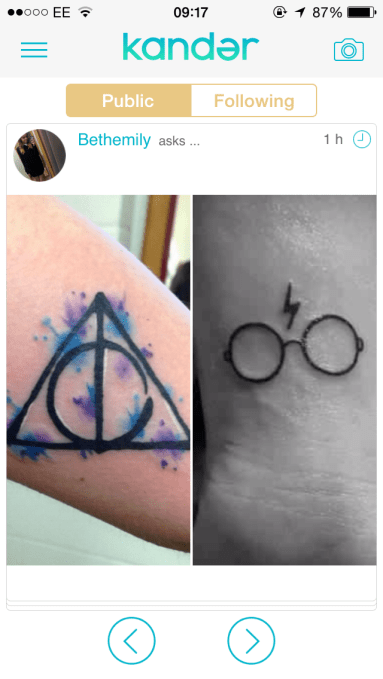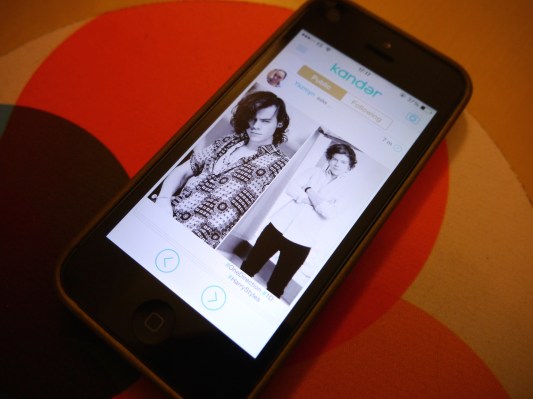The Tinder-fication of app interfaces continues apace. We’ve now seen Tinder for shopping, for reading news articles, for choosing which outfit to wear, for fashion price-tracking, for sorting your iPhone photos, for real estate, for gleaning travel intel, and even for choosing which pet to adopt (well if it’s good enough for human hook-ups, why not hounds?). And that’s by no means a comprehensive list.
Well here’s one more: meet just launched Kander — a social photo sharing app for iOS that uses a swipe right to like it or left to dislike mechanism to allow users to deliver snap judgements on their friends’ photos. So that could be a verdict on their dress sense, or food choice, or taste in music, or their new tattoo, or whatever. So long as it can be photographed and captioned, Kander lets folks vote.
That voting mechanism is its main twist vs existing photo sharing giants like Instagram. The app allows users post a single photo to harvest others’ likes (or dislikes) — via swipe voting. Or they can combine two shots into the same frame to make a ‘this or that’ visual poll — so their friends can vote on one or other of the two images. So which of their selfies they should post to Instagram, say, or which floppy hairstyle suits their fave celeb best, or which dress they should wear out. And so on. (It’s basically Hot Or Not redux. Or the now defunct Fashism — but with a slicker interface.)
The user can choose whether to post a photo publicly, to all Kander users, or quasi privately by limiting it to just to their own followers. They also get to set how long their photo poll will run for — with the app allowing various increments starting at a minimum of 5 minutes or up to a maximum of 24 hours. Kander includes the prerequisite series of filters so users can tweak shots before posting.
And, like the zeitgeisty digital cocktail it’s clearly aiming to be, Kander adds in a dash of anonymity to spice up and lubricate proceedings. All votes and any comments remain anonymous during the duration of the poll. But while votes always remain anonymous, comments are ‘unlocked’ after the voting period is up, presumably so any unvarnished truths end up feeling more like tactful verdicts — whatever the numerical result of the poll.

The ‘this or that’ visual polling element of Kander is reminiscent of some of the functionality offered on Urturn’s social expressions platform. But this is mobile first, while the latter has focused on building out a web platform. Kander is also a lot snappier, thanks to that swipey ‘Tinderface’.
Kander is the creation of bootstrapping, LA-based startup, with founder, friends and family savings — and “the team’s sweat equity” — getting it to launch point. CEO Anthony Alcazar says the idea came to him after a former girlfriend asked for a verdict on which dress she should wear — and apparently wasn’t entirely happy with his “honest opinion”.
“It was at that very moment that I thought to myself, I wish there was a way to give and get honest opinions without the fear of backlash. Kander was born,” says Alcazar.
While Kander is the first app for the startup — and Alcazar says its 22-strong team does not include anyone with prior experience in the tech industry space — he notes they have brought on Michael Bryzek, co-founder and CTO of Gilt, as an advisor.
“His vast experience and expertise in the tech industry has helped Kander tremendously. He has advised us on both the engineering side and business side. Our Creative Director Kenya Kinski Jones and Business Development Director Ollie Spano have secured celebrity partnerships that will definitely help for marketing,” says Alcazar.
“Kander is my first app and I am not a tech guy at all. I had an idea, a dream, a vision that many people believed in and now we are here. I am very thankful to the tech community for always helping,” he adds.
So what about monetization? The app is of course free. But Alcazar and co see several channels for monetizing usage in future — assuming they can gain traction with their Tinder for truthful verdicts.
Firstly the polling function itself could be used to allow companies to poll people to get honest opinions on their products. So Tinder for market research. The team is also planning to sell advertising, and — you guessed it — stickers based on celebrity personas. Brands will also be able to advertise via paid digital stickers.
